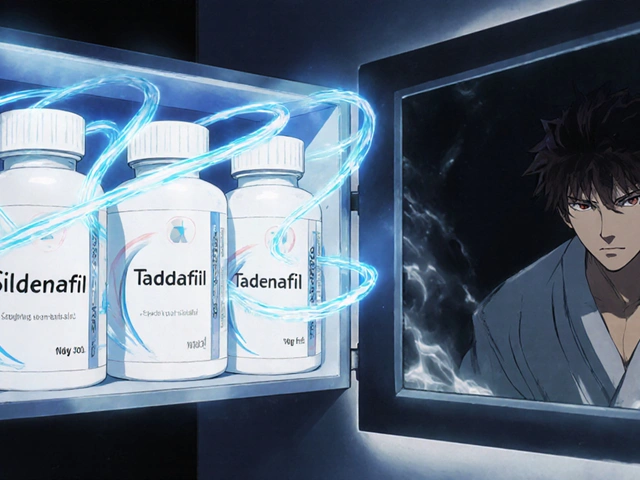When women hit menopause, their bodies stop making estrogen. That drop doesn’t just cause hot flashes-it can lead to sleepless nights, dry skin, mood swings, and even long-term risks like bone loss. For decades, Conjubrook (conjugated estrogens) has been one of the most prescribed hormone therapies to manage these symptoms. But it’s not the only option. And with growing concerns about risks, more women are asking: are there better, safer, or more natural alternatives?
What is Conjubrook, really?
Conjubrook is a brand name for a mixture of estrogen hormones derived from pregnant mare’s urine. It contains multiple estrogen compounds, including estrone and equilin, which your body converts into active forms. It’s been on the market since the 1940s and was once the gold standard for hormone replacement therapy (HRT).
Doctors prescribe it for moderate to severe hot flashes, night sweats, vaginal dryness, and to prevent osteoporosis in postmenopausal women. The typical dose ranges from 0.3 mg to 1.25 mg daily, taken orally. It’s available as tablets, and some versions are combined with progestin (like in Prempro) for women who still have a uterus to protect against uterine cancer.
But here’s the catch: large studies like the Women’s Health Initiative (WHI) in the early 2000s found that long-term use of conjugated estrogens-especially when combined with progestin-increased the risk of breast cancer, stroke, blood clots, and heart disease in some women. That sent shockwaves through the medical world. Since then, guidelines have shifted. Now, HRT is recommended only for the shortest time possible and at the lowest effective dose.
Why look for alternatives?
Not every woman needs or wants hormone therapy. Some have a family history of breast cancer. Others have had blood clots, liver disease, or migraines with aura. Some simply prefer to avoid synthetic hormones. And for many, the side effects-bloating, breast tenderness, mood changes-are too much to bear.
Today, doctors don’t just say “take estrogen” anymore. They ask: What’s your risk profile? What symptoms are you struggling with? What’s your goal? That’s why alternatives are no longer just backup options-they’re often the first choice.
Non-hormonal prescription options
There are now several FDA-approved medications that help with hot flashes and night sweats without using estrogen at all.
- Brisdelle (paroxetine): This is the only non-hormonal pill approved specifically for hot flashes. It’s a low-dose version of the antidepressant Paxil. Studies show it reduces hot flash frequency by about 50%. Side effects include nausea, fatigue, and dry mouth. Not ideal for everyone, but it works for those who can’t take estrogen.
- Veozah (fezolinetant): Launched in 2024, this is the newest player. It targets a brain receptor involved in temperature control. In clinical trials, women saw a 50-60% reduction in hot flashes within four weeks. No increased risk of blood clots or breast cancer. It’s expensive-around $600/month without insurance-but it’s a game-changer for women who want to avoid hormones entirely.
- SSRIs and SNRIs: Drugs like venlafaxine (Effexor) and escitalopram (Lexapro) are commonly prescribed off-label for hot flashes. They’re not as fast-acting as Veozah, but they’re cheaper and often covered by insurance. Many women report improved sleep and mood along with fewer hot flashes.

Bioidentical hormones: Are they safer?
You’ve probably heard of “bioidentical hormones.” These are lab-made versions of estrogen and progesterone that match the molecular structure of what your body naturally produces. They’re often marketed as “natural” and safer than conventional HRT like Conjubrook.
Here’s the truth: bioidentical hormones used in FDA-approved products-like estradiol patches, gels, or micronized progesterone-are just as effective and carry similar risks as Conjubrook. The difference? They’re not derived from horse urine. They’re made from soy or yams and then chemically altered to match human hormones.
But here’s where things get murky: compounding pharmacies sell custom-mixed bioidentical hormones in creams, pellets, or capsules. These aren’t FDA-approved. Dosing is inconsistent. Some products contain estrogen levels far higher than recommended. The FDA and major medical groups like the North American Menopause Society warn against them. There’s no proof they’re safer-and plenty of evidence they can be dangerous.
Plant-based and herbal options
Many women turn to supplements like black cohosh, red clover, or soy isoflavones. These contain phytoestrogens-plant compounds that weakly mimic estrogen.
Black cohosh: Some studies suggest it helps reduce hot flashes, especially in the first 3-6 months. But long-term safety data is lacking. A few cases of liver damage have been reported. Avoid if you have liver disease.
Red clover: Contains isoflavones similar to those in soy. Small trials show modest benefit, but results are mixed. It’s generally safe, but not recommended for women with estrogen-sensitive cancers.
Soy: Eating whole soy foods-tofu, edamame, tempeh-may help slightly. One study found women who ate 50 mg of soy isoflavones daily had 20% fewer hot flashes. But supplements? Not so much. The body absorbs soy better from food than pills.
Other herbs like dong quai, evening primrose oil, and flaxseed show little to no benefit in high-quality studies. Don’t waste your money.
Non-medical strategies that actually work
Before you reach for a pill-hormonal or herbal-try lifestyle changes. They’re free, safe, and often more effective than people think.
- Weight management: Losing even 5-10% of body weight reduces hot flash frequency by up to 50%. Fat tissue produces estrogen, so less fat means fewer triggers.
- Exercise: Regular aerobic activity-brisk walking, cycling, swimming-lowers stress, improves sleep, and reduces hot flashes. Aim for 150 minutes a week.
- Cooling techniques: Dress in layers, keep a fan nearby, avoid spicy food and alcohol. Simple, but powerful.
- Cognitive behavioral therapy (CBT): A 2023 study in The Lancet found CBT reduced hot flash bother by 60% in women who didn’t respond to other treatments. It doesn’t stop the flashes-it changes how you react to them.
- Acupuncture: Mixed results, but some women report real relief. It’s worth trying if you’re open to it.

Which option is right for you?
There’s no one-size-fits-all answer. Your choice depends on your health history, symptom severity, and personal values.
If you’re young (under 60), healthy, and have severe hot flashes that disrupt your life, low-dose estrogen-whether Conjubrook or bioidentical estradiol-might still be the best option. Use it for the shortest time possible, ideally under 5 years.
If you have a history of breast cancer, blood clots, or stroke, avoid estrogen entirely. Stick with non-hormonal options like Veozah, paroxetine, or venlafaxine.
If you’re looking for a natural path, combine lifestyle changes with evidence-backed herbs like black cohosh (short-term) and soy foods. Skip the unregulated compounding creams.
And if your main issue is vaginal dryness, you don’t need systemic hormones. Low-dose vaginal estrogen creams, rings, or tablets (like Estrace Vaginal) deliver estrogen directly where it’s needed-with almost no absorption into the bloodstream. Safer and highly effective.
What to ask your doctor
Don’t just accept the first prescription. Ask:
- What are my risks for stroke, blood clots, or breast cancer?
- Is there a non-hormonal option that could help my symptoms?
- What’s the lowest effective dose I can use?
- How long should I stay on this treatment?
- Are there any tests I should have before starting?
Good doctors won’t push you toward Conjubrook. They’ll help you weigh the trade-offs and find what fits your life.
Final thoughts
Conjubrook isn’t evil. It’s just outdated. For many women, it’s no longer the best choice. Newer, safer, and more targeted options exist. The goal isn’t to eliminate menopause symptoms at all costs-it’s to live well during this phase of life. That might mean a low-dose patch, a daily pill, a cooling fan, or a daily walk. What matters isn’t whether it’s synthetic or natural. What matters is whether it works-for you, safely, and without making your life harder.
Is Conjubrook still prescribed today?
Yes, but much less often than before. Today, doctors prescribe it only for women under 60 with severe menopausal symptoms who don’t have a history of breast cancer, blood clots, or heart disease. It’s typically used at the lowest dose for the shortest time possible-often just 1-3 years.
Are bioidentical hormones safer than Conjubrook?
Only if they’re FDA-approved products like estradiol patches or micronized progesterone. Custom-compounded bioidentical hormones aren’t proven safer and can be dangerous due to inconsistent dosing. The term “bioidentical” doesn’t mean safer-it just means the molecules are identical to human hormones. The delivery method and dose matter more than the label.
Can I use herbal supplements instead of Conjubrook?
Some, like black cohosh and soy, may help mild symptoms, but they’re not as reliable as prescription options. They won’t prevent bone loss or treat vaginal atrophy. Avoid unregulated products from compounding pharmacies. Always tell your doctor what supplements you’re taking-they can interact with other medications.
What’s the best alternative to Conjubrook for hot flashes?
For women who can’t take estrogen, Veozah (fezolinetant) is the most effective new option, reducing hot flashes by 50-60%. For those who can tolerate antidepressants, paroxetine (Brisdelle) or venlafaxine are good, lower-cost alternatives. Lifestyle changes like weight loss and cooling techniques also help significantly.
Does Conjubrook cause weight gain?
Not directly. Weight gain during menopause is usually due to aging, reduced muscle mass, and slower metabolism-not estrogen itself. But some women report water retention or increased appetite on Conjubrook, which can contribute. Managing diet and staying active is more important than blaming the medication.





Ganesh Kamble
October 30, 2025 AT 23:09Veozah’s the real MVP. $600/month? Worth it if I don’t have to wear a fan to bed.
Jenni Waugh
October 31, 2025 AT 04:32Bioidentical isn’t magic. It’s chemistry. And if you’re avoiding estrogen because you’re scared of your own hormones, maybe you should sit with that for a minute.
Also, black cohosh? That’s not medicine. That’s a spiritual cleanse with a side of placebo. Please.
Theresa Ordonda
October 31, 2025 AT 20:10So I went full grandma mode: cold showers, soy milk, and a fan named Barry. I lost 12 lbs. My hot flashes dropped 70%.
Turns out, my body wasn’t broken. I was just fat and stressed. 🙃
Also, stop buying those $40 ‘menopause magic’ teas. They’re just dried leaves and hope.
Judy Schumacher
November 1, 2025 AT 09:33Compounded bioidenticals? Unregulated, untested, and statistically more likely to cause endometrial hyperplasia than to ‘balance your energy.’
And don’t get me started on dong quai. It’s not a herb. It’s a liability.
Megan Raines
November 2, 2025 AT 21:23My doctor said: ‘Use it if you need it. Stop when you don’t.’
And honestly? That’s all the advice I needed.
Mamadou Seck
November 3, 2025 AT 08:25Also why is everyone talking about soy like its magic when i eat tofu every day and still sweat through my shirts
Anthony Griek
November 4, 2025 AT 21:52I didn’t take anything. I started walking at dawn. I stopped watching TV before bed. I ate more beans.
My hot flashes didn’t vanish. But I stopped caring so much.
That’s the real win.
Norman Rexford
November 5, 2025 AT 13:44Back in India we just drink turmeric milk and call it a day
Also why is everyone so scared of estrogen like its a demon? We used to give it to cows to make them bigger and nobody blinked
Wayne Keller
November 5, 2025 AT 22:55Start with sleep. Start with movement. Start with hydration.
If those don’t help, then talk to your doctor about options.
But don’t skip the basics because you want a quick fix.
Menopause isn’t a bug. It’s a feature of being a woman.
And you’re not broken.
Shana Labed
November 7, 2025 AT 18:22So now I’m back to wearing three layers of cotton and keeping a frozen water bottle in my purse.
Also I yell ‘I’M HOT’ at my husband every 20 minutes.
He says it’s cute.
It’s not cute.
California Daughter
November 8, 2025 AT 15:27...I’m just gonna eat more tofu and hope for the best.
Vishwajeet Gade
November 9, 2025 AT 15:30Casey Crowell
November 10, 2025 AT 15:59Whether it’s a patch, a walk, or a fan named Karen-you deserve to feel okay.
And if you’re still on Conjubrook because your doctor never updated their notes? Find a new doctor.
You’re not a 1950s housewife. You’re a human being with options.
Shanna Talley
November 11, 2025 AT 22:42Conjubrook. Black cohosh. CBT. Acupuncture. Cold showers.
What helped most? Talking to other women.
Not the internet. Not the pills. Just sitting in a circle with women who said, ‘Me too.’
That’s the real medicine.
Gina Damiano
November 13, 2025 AT 05:29